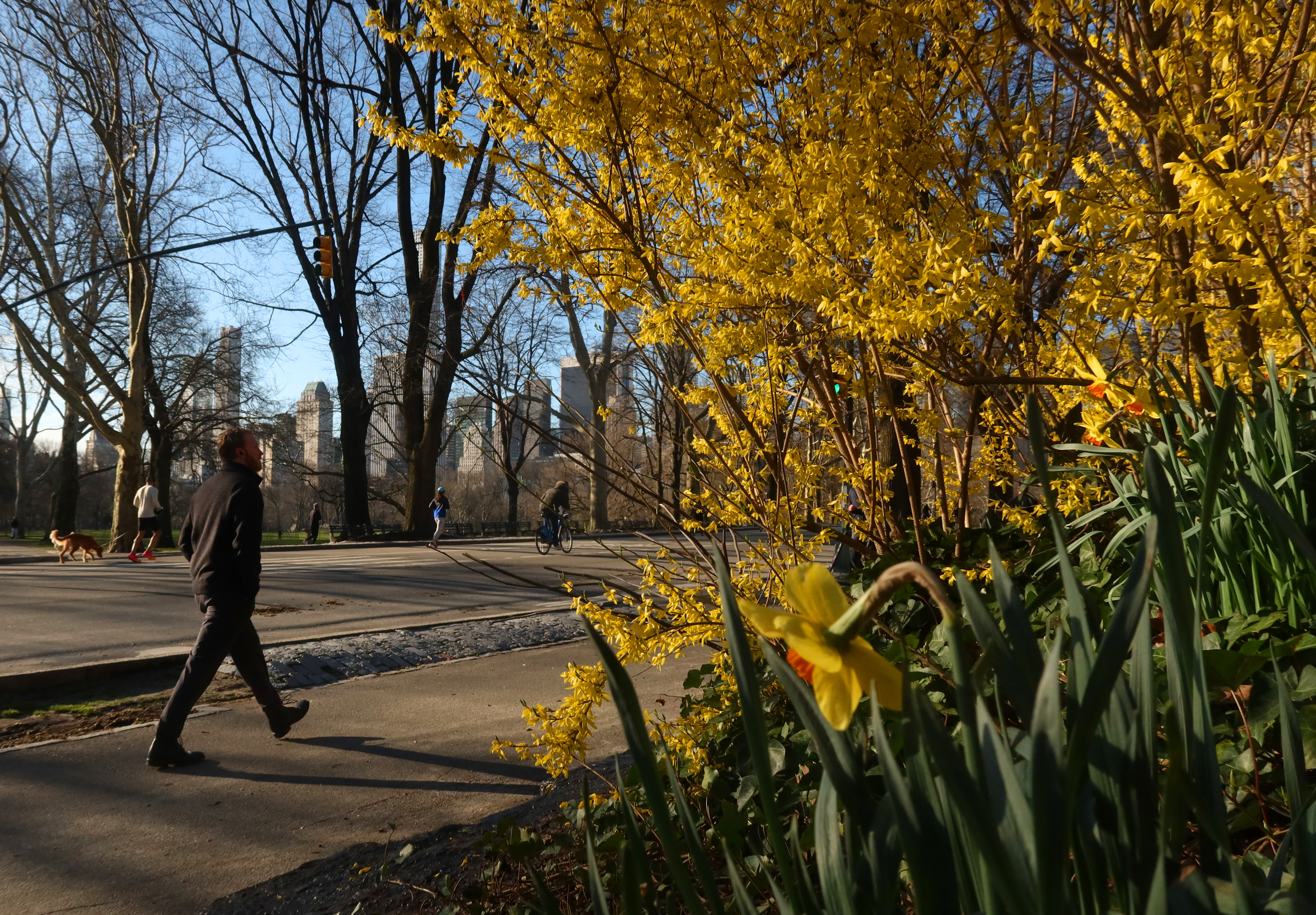Spring Allergy Relief: Check Pollen & Stop Sneezing Now!
Achoo! Spring Allergies Are Back: Your Guide to Pollen Levels and Sneezing Relief
Battling the Beast: Understanding Spring Allergies
Ah, spring! The season of blooming flowers, chirping birds, and… relentless sneezing? If you're one of the tens of millions of Americans who dread the arrival of spring, you're not alone. Spring allergies, triggered by tree, grass, and weed pollens, can turn the most beautiful days into a miserable experience. Runny noses, itchy eyes, coughing, and sneezing are just the beginning. It's like Mother Nature is sending us a beautiful bouquet with a side of suffering.
But fear not! While allergies can feel overwhelming, understanding them and taking proactive steps can significantly improve your quality of life during allergy season. Where you live, what you're allergic to, and your lifestyle all play a crucial role in determining the severity of your symptoms. And while climate change is unfortunately contributing to longer and more intense allergy seasons, the good news is that treatments for seasonal allergies have become more effective over the last decade.
So, how can you navigate this pollen-packed minefield and reclaim your spring? Let's dive into some expert-backed tips and tricks to keep those allergy symptoms at bay, so you can actually enjoy the great outdoors.
Where Are Pollen Levels the Worst This Year?
The Asthma and Allergy Foundation of America (AAFA) releases an annual ranking of the most challenging cities for allergy sufferers. This ranking takes into account factors like over-the-counter allergy medicine use, pollen counts, and the number of available allergy specialists. Think of it as the "Allergy Misery Index." Knowing which cities are hotspots can help you plan travel or understand the potential severity of your allergies if you live in one of these areas.
While the exact ranking changes yearly, consistently challenging cities often include those in the South and Midwest, where warmer temperatures and abundant vegetation contribute to higher pollen counts. Cities with strong winds can also experience higher pollen levels as pollen travels easily.
Understanding Your Enemy: Common Spring Allergens
What exactly is causing all that sneezing and sniffling? The primary culprits in spring are:
- Tree pollen: This is usually the first wave of allergens, starting as early as late winter in some areas. Common offenders include oak, birch, cedar, and maple trees.
- Grass pollen: As spring progresses, grasses start releasing their pollen, causing problems for many allergy sufferers.
- Weed pollen: While weed pollen typically peaks in late summer and fall, some weeds can start releasing pollen in the late spring.
Knowing what you're allergic to is crucial for effective allergy management. Allergy testing, performed by an allergist, can pinpoint your specific triggers, allowing you to target your treatment and avoidance strategies.
Checking the Pollen Forecast: Your Daily Weapon
Before heading out for the day, check the pollen forecast! This is like checking the weather report, but for allergens. Several websites and apps provide pollen forecasts, including:
- The National Allergy Bureau (NAB): This is a reliable source for pollen counts across the United States.
- AccuWeather: Many weather apps include a pollen forecast as part of their daily weather report.
- Local news websites: Local news outlets often provide pollen counts and allergy forecasts specific to your area.
Pay attention to the pollen levels for different allergens (tree, grass, weed) to understand your personal risk. If the pollen count is high for your specific allergens, take extra precautions to minimize your exposure.
Understanding Pollen Count Numbers
Pollen counts are usually reported as grains per cubic meter of air. Here's a general guideline for interpreting pollen count numbers:
- Low: 0-24
- Moderate: 25-49
- High: 50-150
- Very High: Over 150
Keep in mind that these are general guidelines, and individual sensitivity to pollen can vary. Even low pollen counts can trigger symptoms in highly sensitive individuals.
Creating an Allergy-Friendly Home: Your Personal Sanctuary
Your home should be a safe haven from allergens. Here are some ways to create an allergy-friendly indoor environment:
- Keep windows and doors closed: This is especially important during peak pollen times.
- Use air conditioning: Air conditioning can filter out pollen and other allergens from the air.
- Invest in a HEPA air purifier: A HEPA (High-Efficiency Particulate Air) filter can remove pollen, dust, and other allergens from the air.
- Wash bedding regularly: Wash your bedding in hot water at least once a week to remove dust mites and pollen.
- Vacuum frequently: Vacuum carpets and rugs at least twice a week with a vacuum cleaner equipped with a HEPA filter.
- Control humidity: Keep indoor humidity levels below 50% to prevent mold growth, which can also trigger allergy symptoms.
Outdoor Strategies: Minimizing Pollen Exposure
While staying indoors all the time isn't realistic (or desirable!), you can take steps to minimize your pollen exposure when you're outside:
- Avoid peak pollen times: Pollen levels are typically highest in the morning and on windy days.
- Wear sunglasses and a hat: Sunglasses can protect your eyes from pollen, and a hat can prevent pollen from settling in your hair.
- Shower and change clothes after being outside: This will remove pollen from your skin and hair.
- Dry clothes indoors: Hanging clothes outside to dry can expose them to pollen.
- Consider wearing a pollen mask: A pollen mask can filter out pollen from the air you breathe.
Medication Options: From Over-the-Counter to Prescription Strength
Several medications can help relieve allergy symptoms. It's best to consult with your doctor or allergist to determine the best treatment plan for you. Some common options include:
- Antihistamines: These medications block histamine, a chemical released by the body during an allergic reaction. They can help relieve sneezing, runny nose, and itchy eyes.
- Decongestants: These medications can help relieve nasal congestion.
- Nasal corticosteroids: These medications can reduce inflammation in the nasal passages, relieving nasal congestion, runny nose, and sneezing.
- Eye drops: Eye drops can help relieve itchy, watery eyes.
- Allergy shots (immunotherapy): This involves gradually exposing you to increasing amounts of the allergens you're allergic to, which can help desensitize you over time.
Natural Remedies: Complementary Approaches to Allergy Relief
In addition to medication, some natural remedies may help relieve allergy symptoms. These are not a replacement for medical treatment, but may provide supplemental relief. Some options include:
- Nasal saline rinse: This can help flush pollen and other irritants from your nasal passages.
- Honey: Some people believe that local honey can help desensitize you to local pollens.
- Butterbur: This herbal supplement has been shown to reduce allergy symptoms in some studies.
- Quercetin: This antioxidant has anti-inflammatory properties and may help reduce allergy symptoms.
Boosting Your Immune System: A Proactive Approach
A strong immune system can help you better cope with allergies. Here are some ways to boost your immune system:
- Eat a healthy diet: Focus on fruits, vegetables, and whole grains.
- Get enough sleep: Aim for 7-8 hours of sleep per night.
- Manage stress: Stress can weaken your immune system.
- Exercise regularly: Exercise can help boost your immune system.
Allergy-Friendly Gardening: Enjoying the Outdoors Without the Suffering
If you love gardening but suffer from allergies, you can still enjoy your hobby! Choose plants that are insect-pollinated rather than wind-pollinated, as they produce less pollen. Some allergy-friendly options include:
- Roses
- Hydrangeas
- Impatiens
- Petunias
- Zinnias
Also, consider wearing a mask and gloves while gardening, and shower and change clothes afterward to remove pollen from your skin and clothing.
The Impact of Climate Change on Allergies: A Growing Concern
Unfortunately, climate change is exacerbating allergy seasons. Rising temperatures and increased carbon dioxide levels are contributing to longer pollen seasons and higher pollen counts. This means more suffering for allergy sufferers.
Take steps to reduce your carbon footprint and support efforts to combat climate change. This can help protect your health and the health of future generations.
When to See an Allergist: Knowing Your Limits
If your allergy symptoms are severe or persistent, or if over-the-counter medications aren't providing adequate relief, it's time to see an allergist. An allergist can perform allergy testing to identify your specific triggers and develop a personalized treatment plan.
Don't suffer in silence! There are effective treatments available to help you manage your allergies and improve your quality of life.
Allergy-Proofing Your Car: On-the-Go Relief
Your car can also be a haven for pollen! Here's how to allergy-proof your ride:
- Use your car's air conditioner: Make sure your car's air conditioning system has a clean cabin air filter to trap pollen.
- Keep windows closed: Especially during peak pollen times.
- Vacuum your car regularly: This will remove pollen that has accumulated inside.
- Wipe down surfaces: Use a damp cloth to wipe down surfaces like the dashboard and steering wheel to remove pollen.
The Future of Allergy Treatment: Promising Developments on the Horizon
Research into allergy treatments is constantly evolving. New and improved therapies are on the horizon, offering hope for even better allergy management in the future. Stay informed about the latest developments in allergy treatment by talking to your doctor and following reputable sources of allergy information.
Conclusion: Taking Control of Your Allergies and Reclaiming Spring
Spring allergies can be a challenge, but they don't have to control your life. By understanding your triggers, checking pollen forecasts, creating an allergy-friendly environment, minimizing outdoor exposure, and exploring medication and natural remedies, you can effectively manage your symptoms and reclaim your spring. Remember, consulting with an allergist is key to developing a personalized treatment plan. Don't let allergies keep you from enjoying the beauty of the season!
Frequently Asked Questions (FAQs)
- Is it possible to develop allergies as an adult?
Yes, it's definitely possible! Allergies can develop at any age. Sometimes, exposure to new environments or changes in your immune system can trigger the development of allergies later in life.
- How long does allergy season typically last?
The length of allergy season varies depending on your location and the specific allergens you're sensitive to. In general, tree pollen season starts in early spring, followed by grass pollen season in late spring and early summer, and weed pollen season in late summer and fall.
- Are there any foods that can help relieve allergy symptoms?
While food allergies are a separate issue, certain foods with anti-inflammatory properties, like ginger, turmeric, and fatty fish, might help reduce overall inflammation and potentially alleviate allergy symptoms. Probiotic-rich foods like yogurt and kefir can also support gut health, which is linked to immune function.
- Can I become immune to my allergies over time?
It's unlikely to become completely immune to allergies, but immunotherapy (allergy shots) can help desensitize you to allergens over time, reducing the severity of your symptoms. In some cases, people may experience a gradual decrease in allergy symptoms as they age, but this isn't guaranteed.
- Are there any non-drowsy antihistamines available?
Yes! Several non-drowsy or less-drowsy antihistamines are available over the counter, such as loratadine (Claritin), cetirizine (Zyrtec), and fexofenadine (Allegra). Keep in mind that individual reactions can vary, so it's always a good idea to try a new antihistamine when you don't need to be at peak alertness.

